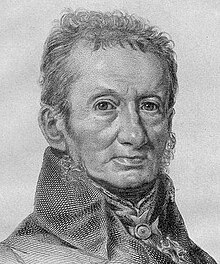
Johann Gottfried Jakob Hermann (28 November 1772 – 31 December 1848) was a German classical scholar and philologist. He published his works under the name Gottfried Hermann or its Latin equivalent Godofredus Hermannus.

Biography
He was born in Leipzig. Entering its university at the age of fourteen, Hermann at first studied law, which he soon abandoned for the classics. After a session at Jena in 1793–1794, he became a lecturer on classical literature in Leipzig, in 1798 professor extraordinarius of philosophy in the university, and in 1803 professor of eloquence (and poetry, 1809). His students included Leopold von Ranke. In 1840 in occasion of his 50th doctoral anniversary he received a medal. He died in Leipzig.
Views
Hermann maintained that an accurate knowledge of the Greek and Latin languages was the only road to a clear understanding of the intellectual life of the ancient world, and the chief, if not the only, aim of philology. As the leader of this grammatico-critical school, he came into collision with Philipp August Böckh and Karl Otfried Müller, the representatives of the historico-antiquarian school, which regarded Hermann's view of philology as inadequate and one-sided.
Works
Hermann devoted his early attention to the classical poetical metres, and published several works on that subject, the most important being Elementa doctrinae metricae (1816), in which he set forth a scientific theory based on the Kantian categories. He also wrote a Handbuch der Metrik (1798). His writings on Greek grammar are also valuable, especially De emendanda ratione Graecae grammaticae (1801), and notes and excursus on François Viger's treatise on Greek idioms. The principles of the new method he introduced are not only explicitly developed in De Emendenda Ratione Græcæ Grammaticæ, but are practically illustrated in his numerous editions of the ancient classics.
His editions of the classics include several of the plays of Euripides; the Clouds of Aristophanes (1799); Trinummus of Plautus (1800); Poëtica of Aristotle (1802); Orphica, a collection of works of Orphic literature (1805); the Homeric Hymns (1806); and the Lexicon of Photius (1808). In 1825 Hermann finished the edition of Sophocles begun by Erfurdt. His edition of Aeschylus was published after his death in 1852. The Opuscula, a collection of his smaller writings in Latin, appeared in seven volumes in Leipzig between 1827 and 1839. These show his power of dealing with chronological, topographical, and personal questions, and also contain some poems.
References
- ^ Chisholm 1911.
- http://hdl.handle.net/10900/100742 S. Krmnicek und M. Gaidys, Gelehrtenbilder. Altertumswissenschaftler auf Medaillen des 19. Jahrhunderts. Begleitband zur online-Ausstellung im Digitalen Münzkabinett des Instituts für Klassische Archäologie der Universität Tübingen, in: S. Krmnicek (Hrsg.), Von Krösus bis zu König Wilhelm. Neue Serie Bd. 3 (Tübingen 2020), 72-74
- Vigeri, Francisci, De praecipuis graecae dictionis idiotismis liber (1802, 4th edition. 1834).
Bibliography
| This article includes a list of general references, but it lacks sufficient corresponding inline citations. Please help to improve this article by introducing more precise citations. (July 2013) (Learn how and when to remove this message) |
 This article incorporates text from a publication now in the public domain: Chisholm, Hugh, ed. (1911). "Hermann, Johann Gottfried Jakob". Encyclopædia Britannica. Vol. 13 (11th ed.). Cambridge University Press. p. 367. This work in turn cites:
This article incorporates text from a publication now in the public domain: Chisholm, Hugh, ed. (1911). "Hermann, Johann Gottfried Jakob". Encyclopædia Britannica. Vol. 13 (11th ed.). Cambridge University Press. p. 367. This work in turn cites:
- Monograph by Otto Jahn (1849)
- Monograph by Hermann Köchly (1874)
- Conrad Bursian, Geschichte der klassischen Philologie in Deutschland (1883)
- Conrad Bursian (1880), "Hermann, Gottfried", Allgemeine Deutsche Biographie (in German), vol. 12, Leipzig: Duncker & Humblot, pp. 174–180
- Sandys, History Class. Schol. iii.
- This article incorporates text from a publication now in the public domain: Gilman, D. C.; Peck, H. T.; Colby, F. M., eds. (1905). "Hermann, Gottfried" . New International Encyclopedia (1st ed.). New York: Dodd, Mead. This work in turn cites:
- Jahn, Gottfried Hermann, eine Gedächtnisrede (Leipzig, 1849)
- Köchly, Gottfried Hermann (Heidelberg, 1874)
- Bursian, Geschichte der klassischen Philologie in Deutschland (Munich, 1883)
External links
- "Johann Gottfried Jakob Hermann" . Encyclopædia Britannica. Vol. XI (9th ed.). 1880. p. 741.
- 1772 births
- 1848 deaths
- People from the Electorate of Saxony
- 18th-century German scholars
- German classical scholars
- German philologists
- Writers from Leipzig
- Leipzig University alumni
- Academic staff of Leipzig University
- University of Jena alumni
- 18th-century philologists
- 19th-century philologists
- Recipients of the Pour le Mérite (civil class)